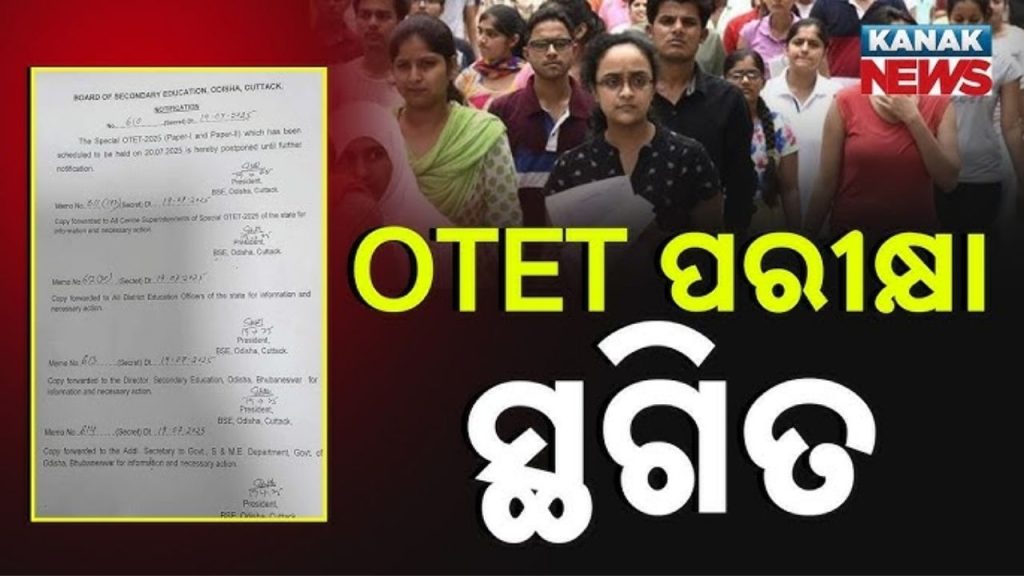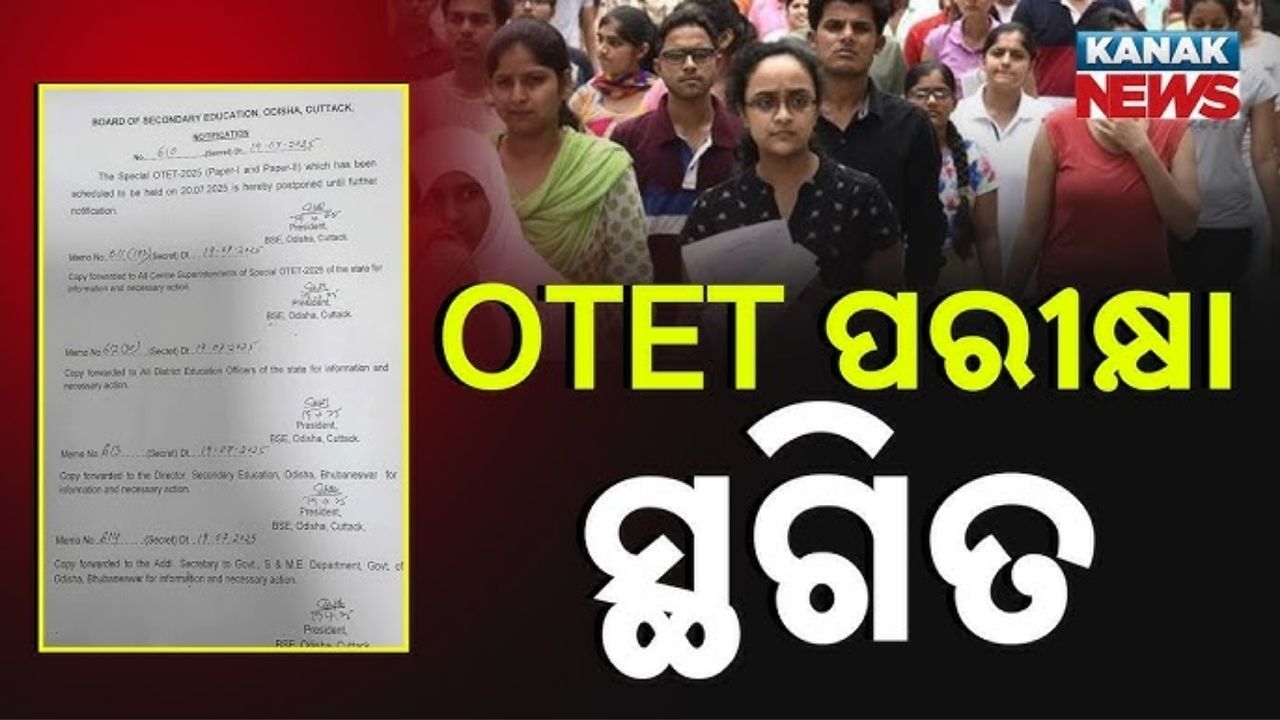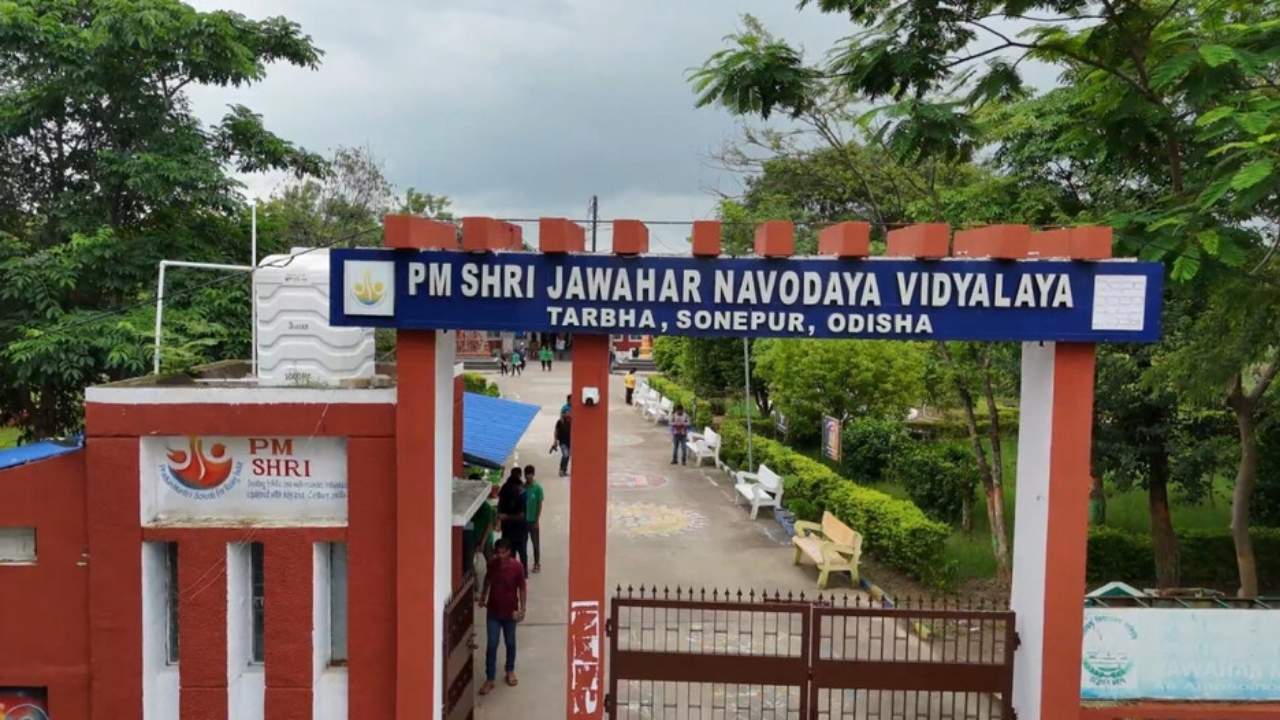In an unexpected turn of events, the Odisha Crime Branch has detained Bijay Mishra, a primary school teacher from Rayagada district, in connection with a significant breach of trust – the leak of the Odisha Teacher Eligibility Test (OTET) question paper. This incident has stirred controversy across the state, as the exam, originally scheduled for July 20, 2025, had to be abruptly postponed after the question paper was found circulating on social media platforms like WhatsApp, Facebook, and Instagram. Authorities are now intensifying their investigation into how such a breach could have occurred and are taking strong steps to prevent similar incidents in the future.

In this article, we’ll break down the OTET question paper leak case, explore the role of the Odisha Crime Branch in resolving this issue, and provide useful insights into how exam security can be improved to safeguard the integrity of public exams. Whether you’re a concerned parent, a student preparing for OTET, or an educator, this guide offers valuable insights to help understand the situation better and make sense of what’s happening.
OTET Question Paper Leak Case
| Key Aspect | Details |
|---|---|
| Incident | OTET question paper leaked on social media |
| Key Person Detained | Bijay Mishra, primary school teacher from Rayagada |
| Date of the Incident | July 20, 2025, the exam was to take place |
| Exam Affected | Odisha Teacher Eligibility Test (OTET) |
| Response from Authorities | Exam postponed; six BSE officials transferred |
| Investigation | Odisha Crime Branch intensifies probe, conducting searches |
| Further Action | Strengthening exam security protocols |
| Official Link | BSE Odisha |
The OTET question paper leak has raised significant questions about the integrity of public exams in Odisha. While the investigation is still underway, it serves as a wake-up call for the need to improve exam security measures. With stronger protocols, more advanced technology, and tighter monitoring, we can ensure that exams are conducted fairly and securely for all candidates. As we await the rescheduled exam, it’s clear that there’s much work to be done to restore public trust and strengthen the education system for the future.
What Is OTET, and Why Does It Matter?
Before diving into the specifics of the leak, let’s first take a step back and understand what OTET is. The Odisha Teacher Eligibility Test (OTET) is an essential examination for individuals aspiring to become teachers in government-run schools across the state of Odisha. It assesses the knowledge and competency of candidates in various subjects such as mathematics, science, social studies, and language skills.
This exam is critical for anyone looking to teach at the primary and upper primary levels in Odisha. As such, it has a high level of importance not just for the candidates but for the entire education system, which relies on qualified teachers to impart quality education to students.
For more about OTET, you can visit the official BSE Odisha website.
The Leak: How Did It Happen?
The OTET paper leak case came to light just hours before the exam was set to begin on July 20, 2025. The question paper was found to be circulating on various social media platforms. WhatsApp, Facebook, and Instagram were buzzing with images and PDFs of the exam paper, creating an environment of confusion and suspicion.

Authorities had no choice but to cancel the exam to maintain its integrity and ensure fairness for all candidates. The leak was especially troubling because it raised questions about the security measures in place to protect such sensitive materials. How did the question paper get into the hands of unauthorized individuals? What loopholes in the system allowed this to happen?
The Role of Bijay Mishra
One of the key figures in this investigation is Bijay Mishra, a primary school teacher from Ambadala village in Rayagada district. Mishra, who also holds the position of president of the Rayagada District Ex-Cadre Teachers’ Association, was detained by the Odisha Crime Branch. Authorities believe he might have played a significant role in the leak, although the investigation is still ongoing.
It’s worth noting that Mishra’s detention has raised a lot of eyebrows, particularly due to his prominent role in the local education system. The Crime Branch has intensified its probe and is questioning various suspects across districts to uncover the source and extent of the leak. Mishra’s arrest signals that the authorities are taking this matter seriously and are committed to identifying all parties involved.
The Response from the Board of Secondary Education (BSE), Odisha
In the wake of the leak, the Board of Secondary Education (BSE), the governing body responsible for organizing OTET, acted quickly to mitigate the damage. The exam was postponed, and six BSE officials, including staff members from its confidential and coordination sections, were transferred on July 26.
These swift actions underline the seriousness of the situation and the BSE’s commitment to ensuring the integrity of future examinations. The authorities are also reviewing the exam security protocols to identify and fix any vulnerabilities that could lead to similar incidents in the future.
Exam Security: What Went Wrong?
The OTET leak has brought attention to the security measures in place for public exams. While many exams around the world have embraced digital technologies to streamline the process, traditional paper-based exams in India still rely heavily on physical handling, which can be a significant security risk.
In the case of the OTET, it appears that the security measures were not foolproof. Despite being a high-stakes exam, the question paper was able to leak and circulate on social media within hours. This raises several critical questions:
- Who had access to the question paper before the leak?
- What precautions were taken to ensure the paper’s security before the exam?
- How could the question paper be leaked without detection?
In response to these concerns, the Crime Branch is investigating these gaps, conducting searches, and questioning suspects across various districts. It’s clear that the investigation is only in its initial stages, and further developments will shed light on how the leak happened and who is ultimately responsible.
How Can Exam Security Be Strengthened?
As students, teachers, and parents anxiously await the rescheduled OTET exam, there are important lessons to be learned from this situation. While the leak itself is unfortunate, it provides an opportunity to explore how exam security can be improved to prevent similar breaches in the future.
Here are some key measures that could strengthen exam security:
1. Digitization and Encryption of Exam Papers
One of the primary issues with paper-based exams is that physical copies are vulnerable to being intercepted, stolen, or leaked. Transitioning to digital formats that are encrypted and securely distributed could significantly reduce the risk of leaks. Digital exams can be more easily monitored, and security protocols such as password protection, watermarks, and digital signatures can be employed to prevent unauthorized access.
2. Stricter Handling and Distribution Protocols
The handling and distribution of exam materials should be more tightly controlled. The use of secure transport services and restricted access protocols for exam staff members would make it harder for sensitive materials to fall into the wrong hands. For instance, only authorized personnel should be allowed to carry and distribute exam papers, and they should be monitored closely throughout the process.
3. Enhanced Monitoring and Surveillance During Exam Days
On the day of the exam, robust security measures must be in place to ensure no one is able to access the question paper before the exam begins. This can include the use of surveillance cameras at exam centers and random checks of exam staff members for any unauthorized materials. Additionally, exam centers should employ biometric systems to track and verify the identity of examiners and candidates.
4. Improved Reporting Mechanisms for Suspicious Activity
Another step forward would be to create a whistleblower system that allows exam staff, teachers, and candidates to report suspicious activity without fear of retribution. This could help authorities detect any irregularities before they escalate into larger issues.
5. Collaboration Between Authorities and Technology Experts
Collaboration between government bodies and technology experts can help develop innovative solutions to prevent leaks. The use of advanced encryption software, artificial intelligence, and machine learning can help detect unusual patterns and flag potential security risks before they happen.
Yuvodaya Honors NEET and JEE Achievers: Celebrating Excellence in Education
Odisha’s Higher Education Overhaul Targets Low-Enrolment Institutions
Odisha Unveils AI-Powered Tender Management System to Accelerate Project Execution
FAQs
What is the Odisha Teacher Eligibility Test (OTET)?
The OTET is an entrance examination for aspiring teachers in Odisha. It evaluates candidates’ knowledge in subjects like mathematics, science, and language to determine their eligibility to teach at primary and upper primary levels.
Why was the OTET exam canceled?
The exam was canceled after the question paper was leaked and circulated on social media platforms like WhatsApp, Facebook, and Instagram. This raised concerns about the fairness and integrity of the examination process.
Who was detained in the OTET paper leak case?
Bijay Mishra, a primary school teacher from Rayagada, was detained by the Odisha Crime Branch in connection with the OTET paper leak. He is also the president of the Rayagada District Ex-Cadre Teachers’ Association.
What steps are being taken to improve exam security?
Authorities are reviewing and strengthening security protocols for future exams. This includes measures like encryption of exam papers, stricter handling protocols, enhanced monitoring on exam days, and collaboration with technology experts to prevent future leaks.





